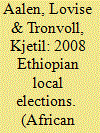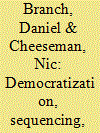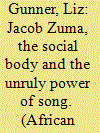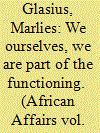|
|
|
Sort Order |
|
|
|
Items / Page
|
|
|
|
|
|
|
| Srl | Item |
| 1 |
ID:
085978


|
|
|
|
|
| Publication |
2009.
|
| Summary/Abstract |
ETHIOPIA CARRIED OUT LOCAL ELECTIONS FOR NEIGHBOURHOOD (kebele) and county (woreda) assemblies on 13 and 20 April 2008, respectively.1 By law, these elections were supposed to be conducted in 2005, but the chaotic period after the general elections that year made it impossible to carry out the local polls. Considering the formative character of the 2005 general elections, where the opposition for the first time challenged the ruling Ethiopian People's Revolutionary Democratic Front (EPRDF), and the dramatic political crackdown in the post-election period, the conduct of the 2008 local elections is important in understanding the status and direction of Ethiopia's overall process of democratization. The constrained political context and government strategies of intimidation and harassment - leading the main opposition parties to withdraw from the local elections - signal the return of electoral authoritarianism in Ethiopia.
|
|
|
|
|
|
|
|
|
|
|
|
|
|
|
|
| 2 |
ID:
085977


|
|
|
|
|
| Publication |
2009.
|
| Summary/Abstract |
Based on long-term ethnographic research, this article analyses the relations between local politics and farmers' participation in rural development in Tigray (Ethiopia). It takes an actor-oriented approach and focuses on local government officials and farmer representatives, who mediate between the government agencies that undertake rural development programmes and the farmers whom they address. To reach the target numbers of programme beneficiaries, these local development brokers 'mobilize' farmers to participate. They capitalize upon the historical legitimacy of the 1975-91 revolution against the military Derg dictatorship in which the Tigray People's Liberation Front (TPLF), now heading the national government, and Tigray's rural population successfully joined forces. They revitalize farmers' collective memory of this alliance and reinvent the revolutionary grassroots institutions through which it was realized. The effects of mobilization on participation in development are most evident among farmers who are members of the TPLF. A TPLF-development nexus arises, structuring local political career opportunities along the lines of development. The case study attempts to contribute to an empirical understanding of the entanglement of local politics and local development brokerage in rural African societies.
|
|
|
|
|
|
|
|
|
|
|
|
|
|
|
|
| 3 |
ID:
085972


|
|
|
|
|
| Publication |
2009.
|
| Summary/Abstract |
In order to complement ongoing current empirical research, this article draws wider lessons from the crisis that grew out of the disputed Kenyan presidential election of December 2007. Looking beyond the immediate trigger for the subsequent violence - namely, the election itself - the paper instead locates the roots of the crisis within three historical trends: elite fragmentation, political liberalization, and state informalization.The origins of each can be traced to the style of rule employed by Daniel arap Moi. Even though his first government of 2002-5 perpetuated these trends, President Mwai Kibaki failed to recognize their implications for national unity and the exercise of power in 2007. The article then addresses the sequencing debate within the literature on democratization, identifying the lessons that can be taken from the Kenyan case for other states. Kenya has shown again that political liberalization is a high-risk activity that can produce unintended side-effects. Drawing on examples from other African states, we argue that the processes of democratization and reform can be undertaken simultaneously, but that this twin-tracked approach requires institutional reforms not yet undertaken by a large number of African polities.
|
|
|
|
|
|
|
|
|
|
|
|
|
|
|
|
| 4 |
ID:
085974


|
|
|
|
|
| Publication |
2009.
|
| Summary/Abstract |
This article tracks the life of the song 'Umshini Wami' (My Machine Gun) adopted by Jacob Zuma, the President of the African National Congress, since early 2005. It explores the wider implications of political song in the public sphere in South Africa and aims to show how 'Umshini Wami' helped Jacob Zuma to prominence and demonstrated a longing in the body politic for a political language other than that of a distancing and alienating technocracy. The article also explores the early pre-Zuma provenance of the song, its links to the pre-1994 struggle period and its entanglement in a seamless masculinity with little place for gendered identities in the new state to come. It argues too that the song can be seen as unstable and unruly, a signifier with a power of its own and not entirely beholden to its new owner
|
|
|
|
|
|
|
|
|
|
|
|
|
|
|
|
| 5 |
ID:
085976


|
|
|
|
|
| Publication |
2009.
|
| Summary/Abstract |
This article analyses the accusations that have emerged since 2001 of predatory behaviour during the presidency of Frederick T. Chiluba (1991-2001). It advocates a detailed analysis of the practices that have come to light in order to move beyond a generalized interpretation of the persistence of predatory elites in Africa. Three specific themes appear. First, there is a danger of oversimplification of these conflicts as between the international community and national governments. The political struggles tend to be more complicated than generally presented, and international involvement meshes with local political struggles. Second, predatory behaviour or corruption is a social process that is embedded in wider national and international networks. It is therefore difficult to locate culpability exactly in clearly designated protagonists. Third, there is a danger of imputing an economic and political rationality to this behaviour which may best be designated as theft. The overall theme of the article is that there are important national cultural influences in the way these predatory practices are dealt with. These are obfuscated by a blander critique identifying partial reform that leaves predatory elites untouched.
|
|
|
|
|
|
|
|
|
|
|
|
|
|
|
|
| 6 |
ID:
085975


|
|
|
|
|
| Publication |
2009.
|
| Summary/Abstract |
As a new justice institution, the International Criminal Court needs to gain legitimacy not just with states, but also in civil society, both at the global level and in the societies in which it intervenes. This article, based on interviews, NGO documents, newspaper articles, and participatory observation, looks at civil society relations with the ICC in relation to its most recent and least publicized investigation, in the Central African Republic (CAR). It charts the role of civil society organizations, local and international, in the opening of the investigation, and it discusses the initial responses of civil society figures and victims in the CAR to the investigation. It finds that, unlike in any of the other situations, the ICC's involvement in the CAR has been largely instigated by local civil society figures, and that, as a result, it operates in a quite receptive context. However, the slow pace of investigations and trials, the meagre outreach to date, and the Court's probable lack of capacity to provide victims with physical and material security are long-term challenges to its ability to meet local expectations of justice
|
|
|
|
|
|
|
|
|
|
|
|
|
|
|
|
|
|
|
|
|